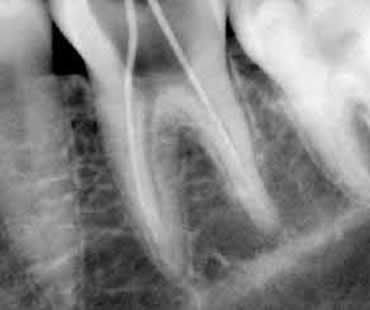
Most people would rather do anything than have a root canal. Unfortunately, this procedure receives a bad rap. A root canal is generally performed to clean out an infected tooth and prevent future problems. Usually, patients feel better after root canal therapy.
Knowing the truth about root canals may help you feel less apprehensive if your dentist recommends this procedure.
- A root canal hurts.
Actually, the pain you feel is caused by the swelling and pressure in your tooth. When a tooth sustains severe trauma, the pulp, or soft nerve center, may die. During a root canal, your dentist will remove the damaged tissue, disinfect the tooth, and seal off the inside. Most people only experience mild soreness afterwards, if they feel any discomfort at all.
- Root canal therapy takes many appointments.
Although this timing depends on the severity of the case, most root canals are completed in one to two appointments. Once your dentist finishes the root canal, you will probably need at least one more visit for restoration of the tooth, usually with an inlay, onlay, or crown.
- I only need a root canal if my tooth hurts.
Pain often lets you know you have a problem with a tooth, but if your tooth root dies you may have no symptoms. The dentist can perform tests to determine the health of a tooth, including temperature and percussion testing.
- The root canal won’t last.
Once the tooth is cleaned and sealed, you should have no further problems with the tooth. Sometimes the restoration of the tooth fails, which can causes the tooth to crack or break. This usually occurs if you wait too long to have a crown or adequate filling placed.
We treat patients from Sicklerville and the surrounding area

How much do you really know about your mouth? Most people understand basic brushing and flossing, but they may not realize the myriad of factors that influence dental health. Knowing how your lifestyle impacts your teeth and gums can help you make the best choices to protect your smile.
True or False: You don’t need to floss every day.
Answer: False. Brushing alone won’t protect your mouth from decay or gum disease. Floss gets hard-to-reach areas, cleaning out the plaque and bacteria that wreak havoc on your oral health.
True or False: Taking care of your tongue is important, so you should brush it regularly.
Answer: True. The tiny bumps on your tongue called papillae trap food and bacteria, which can cause bad breath. Brushing twice a day will keep your breath smelling great.
True or False: Soft drinks and sports drinks don’t damage teeth.
Answer: False. These beverages, as well as red wine and fruit juices, can lead to enamel erosion. It’s best to stick with water, but if you consume these drinks, rinse your mouth when you finish.
True or False: It’s okay to put your baby to bed with a bottle of juice or milk.
Answer: False. When you let your baby or toddler fall asleep with anything but water, you increase the risk of baby bottle tooth decay. This condition occurs because of prolonged bottle feeding, usually during sleep. Young children don’t have good plaque removal, so these beverages provide a breeding ground for bacteria.
True or False: Fluoride reduces decay 20 to 40 percent.
Answer: True. Drinking water with fluoride strengthens tooth enamel and also reduces the amount of acid that the bacteria in your mouth produce. Since fluoride was added to the drinking water supplies across the country, childhood cavity rates have dramatically dropped.
Schedule a dental cleaning appointment today at our Sicklerville dentists office.

Dentistry today does not just include treatments for tooth and gum problems or diseases. The trend in dentistry has expanded to include a wide range of treatments and procedures with the purpose of improving your appearance. The purpose of cosmetic dentistry is to give you the most appealing smile possible so that you can be happy with your look and have an improved self-esteem. Here are some trends in cosmetic dentistry explained.
Bonding
Mild to severely damaged teeth can be treated with dental bonding. A tooth-colored material is applied to the fractured or chipped surface of your tooth and then bonded with a special light. The restoration provides a renewed look to your tooth so that others can’t even tell it was ever damaged.
Teeth whitening
A bright white smile gives of a great impression of oral health and beauty. Stains from age, foods, drinks, and habits like smoking all play a role in making your smile dull and unattractive. Cosmetic dentists offer teeth whitening procedures that can turn your smile around in just an hour.
Veneers
Another way to easily improve your smile is dental veneers. These thin shells usually made of porcelain are permanently adhered to the fronts of your teeth, giving you a bright and flawless smile for many years to come.
Contouring
Instead of having lengthy orthodontic treatment to correct crooked teeth or uneven spacing, contouring is an option to improve your look. Also called tooth reshaping, this procedure is additionally used to correct irregularly shaped teeth and alter issues like overly pointy teeth. During contouring, small amounts of tooth enamel are removed in order to change the tooth’s shape, length, or surface.
Implants and dentures
To replace missing teeth, dental implants are dentures are both options depending on the patient and the specific situation. Many people prefer implants because they are a permanent and secure solution.
Cosmetic dentist in Sicklerville

When you look your best, you exude confidence and grace. A vibrant, white smile can add to the image you convey. Cosmetic dentistry has risen in popularity because it allows people to transform their appearances. Make an appointment with your cosmetic dentist in Sicklerville for a consultation to discuss your smile enhancement options. While some patients choose a complete smile makeover, any of the following procedures can take your smile from dull to dynamite.
Teeth Whitening
The aging process as well as lifestyle choices can dull your smile. With teeth whitening, you can remove stains and look years younger. Most dentists recommend professional teeth whitening, which you can accomplish through in-office sessions or take-home kits.
Bonding
If you have small chips, gaps, or cracks in your smile, your dentist may suggest dental bonding. To repair the damaged area, your dentist will use a tooth-colored resin, which is hardened with a special light. Dental bonding blends in with your natural teeth and restores the look of your smile.
Porcelain Veneers
Created from fine dental porcelain, veneers can totally change your appearance. With porcelain veneers, your dentist can alter the size, shape, and color of your teeth. Depending on your situation, the doctor may suggest custom veneers designed just for your smile, or no-prep veneers, which can be bonded to your teeth but removed at a later time.
Composite Fillings
Over time, metal fillings can crack and seep, causing oral health problems, as well as impacting your smile’s appearance. Tooth-colored fillings are constructed to match your original teeth so they blend in seamlessly. Because they bond to the tooth, composite fillings won’t change shape or leak.
Accelerated Orthodontics
For straighter teeth in three to nine months, consider accelerated orthodontics. Usually, accelerated orthodontics works best for people with mild issues to correct or for those who want to straighten front teeth for an important event like a wedding.

Regardless of what aspect you dislike about your smile, there are cosmetic dentistry procedures to treat them. Smile makeovers are possible to give you the look you’ve been wanting. Not only do they enhance your smile, but they also boost your confidence. You may not know all the options and the problems they address. So here’s a list that can help you decide which of them is relevant to you.
Tooth discoloration
Teeth can easily become discolored from poor hygiene due to consuming foods and drinks such as coffee, red wine, berries, and tea. Smoking is a big culprit for tooth discoloration. Teeth whitening is the most common way to brighten your smile, and various methods are available either at home or professionally.
Misalignment
Teeth that are crowded or malaligned are not only unappealing; they can also make oral hygiene management more difficult and cause added stress on your jaw. Traditional braces, clear methods like Invisalign, crowns, and porcelain veneers are various ways misalignment might be treated. Discuss with your dentist that of those options is best for you.
Gaps
Spaces between your teeth can be embarrassing socially, as well as detrimental to the function of your teeth. Braces or Invisalign are excellent ways to correct gaps. Veneers are another option depending on how large your gaps are. Those are alternatives to cater for your budget.
Gummy smile
Excessive amounts of your gums show when you smile can create what is known as a gummy smile. Treatments may include gum sculpting, veneers, crowns, braces, or surgery.
Missing teeth
Smile restoration can be done with dental implants, bridges, or dentures. Each of these solutions has their good and bad aspects. Therefore, consult your dentist for advice before deciding on it.
Worn-down teeth
If untreated, worn teeth can cause tooth loss or dental health problems. Teeth that are damaged can often be restored with either veneers or crowns.
We look forward to seeing you in our Sicklerville dental office

The goal of root canal therapy is to relieve pain, not cause it. The pain you experience before a root canal is the result of damage to the tissues in the tooth. Root canal therapy removes that damaged tissue, therefore relieving the discomfort you feel. If you are still experiencing tooth pain after undergoing a root canal procedure, it could be an indication of a problem with the treatment.
While mild discomfort is to be expected during the root canal healing process, if the pain continues or becomes more severe, it is likely an indication of a problem. There are several reasons for tooth pain after root canal treatment:
- The tooth has an extra canal that was not cleaned and filled, meaning there is an extra physical root.
- The tooth has a small, tight accessory canal that is difficult to locate on x-rays or hard to access with the necessary tools.
- The tooth is fractured due to the damage and weakened state caused by the original decay and the access cavity that is created to begin the root canal treatment.
- The root canal has become reinfected.
- The small files used by your dentist to clean out the pulp of the tooth sometimes break, resulting in a failed root canal treatment.
In the days immediately following root canal therapy, it is normal to experience some tenderness of the tooth or surrounding gum. This discomfort should be easily managed with over-the-counter painkillers and should subside in a few days. If the pain does not ease in a few days or becomes more severe, contact your dental professional immediately to access your symptoms and determine if you are having root canal complications.
We look forward to seeing you in our Sicklerville dental office












